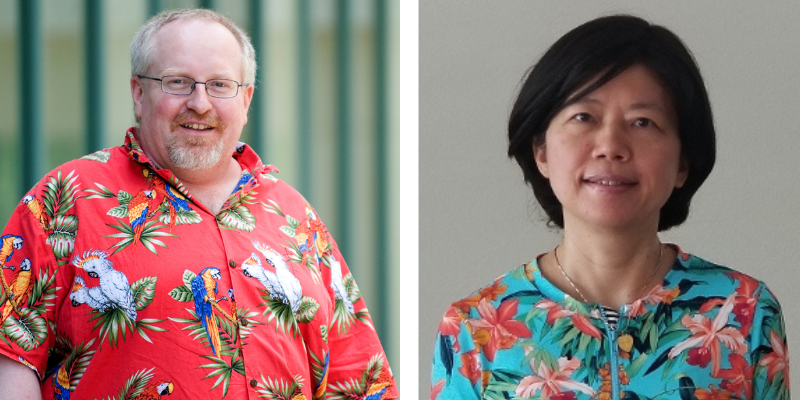
Irvine, Calif., October 10, 2024 — Scientists from the UC Irvine Charlie Dunlop School of Biological Sciences have made a groundbreaking advance that could reshape agriculture, energy production and environmental sustainability. Their new study, published in Nature Catalysis, demonstrates how the laboratories of Professor Yilin Hu and Professor Markus Ribbe successfully engineered Escherichia coli (E. coli) to produce ammonia using a nitrogenase pathway — something that was previously only possible in a small group of nitrogen-fixing bacteria.
The challenge this research addresses is significant. Ammonia, a critical component of fertilizers, is traditionally produced through the energy-intensive Haber-Bosch process, which requires high temperatures, pressures and large amounts of fossil fuels. As global food demand rises, so does the need for sustainable ways to create fertilizers. Nitrogenase, an enzyme that naturally fixes nitrogen from the atmosphere to produce ammonia, offers a cleaner, more efficient alternative. However, until now, transferring this capability to non-nitrogen-fixing organisms like E. coli had been a major scientific hurdle.
“We are confident that the strategy we have developed will not only support future efforts to engineer autonomous nitrogen-fixing crops but also pave the way for creating microbial bioreactors,” explained Professor Yilin Hu. “These bioreactors can leverage the catalytic versatility of nitrogenase to produce valuable chemical commodities, such as ammonia, hydrogen, and hydrocarbons, which are crucial for areas related to energy, agronomy and environment, at ambient conditions.”
The research team combined genes from different bacteria, including Azotobacter vinelandii and Methanosarcina acetivorans, to engineer E. coli to express nitrogenase and synthesize ammonia. By addressing the complex assembly of nitrogenase components step by step, the team successfully reconstituted a fully functional enzyme within E. coli cells. This achievement marks a significant leap toward sustainable, biologically driven ammonia production.
“Heterologous expression of a nitrogenase in non-nitrogen-fixing organisms has been a long-sought goal,” said Professor Akif Tezcan from UC San Diego, who congratulated the team on their success. “This achievement is the product of many years of meticulous and creative work. While there is still more optimization to be done, the demonstration of functional nitrogenase components in E. coli is remarkable and sets the team on the right path.”
The applications of this research are vast. In addition to engineering crops that can fix their own nitrogen, this approach could lead to the development of microbial factories that produce not only ammonia but also hydrogen and hydrocarbons under ambient conditions, offering greener alternatives to current industrial processes. Professor Douglas Rees from the California Institute of Technology added, “It’s wonderful to see this decades-long quest by Yilin and Markus come to fruition. The awesome power of E. coli genetics can now be used to advance the important, but highly challenging, field of biological nitrogen fixation.”
As the world seeks more sustainable solutions to meet agricultural and energy needs, this breakthrough offers hope for reducing reliance on fossil fuels and advancing environmentally friendly methods of chemical production. Professor Markus Ribbe highlighted the importance of this work, saying, “Many scientists have attempted this daunting task, but most have either failed or eventually abandoned it. By focusing on nitrogenase for over two decades, we have developed an understanding that allows us to envision its future applications in microbial bioreactors and autonomous nitrogen-fixing crops.”
The research offers a clear roadmap for further innovation. Scientists and policymakers alike are encouraged to support continued research and development in this area. The potential to revolutionize industries like agriculture and energy is within reach, and now is the time to capitalize on this breakthrough to create a more sustainable future.
About the University of California, Irvine Charlie Dunlop School of Biological Sciences:
Recognized for its pioneering research and academic excellence, the Charlie Dunlop School of Biological Sciences plays a crucial role in the university’s status among the nation’s top 10 public universities, as ranked by U.S. News & World Report. It offers a broad spectrum of degree programs in the biological sciences, fostering innovation and preparing students for leadership in research, education, medicine and industry. Nestled in a globally acclaimed and economically vibrant community, the school contributes to the university’s impact as Orange County’s largest employer and a significant economic contributor. Through its commitment to exploring life’s complexities, the Dunlop School embodies the UCI legacy of innovation and societal impact. For more on the Charlie Dunlop School of Biological Sciences, visit https://www.bio.uci.edu/.
